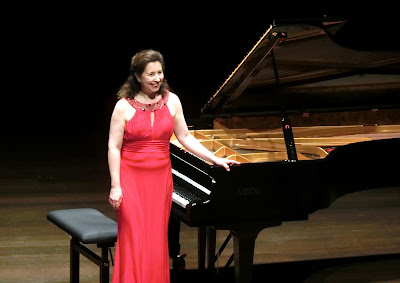ANGELA HEWITT Piano Recital
Victoria Concert Hall
Thursday (4 May 2017 )
This review was published in The Straits Times on 6 May 2017 with the title "Playing Bach with elegance".
Canadian
pianist Angela Hewitt is one of the planet's great Bach interpreters, and so
she was expected to perform Johann Sebastian Bach's keyboard works, as she did
in her previous recitals here. She had played the Goldberg Variations
(2001) and The Well-Tempered Clavier (2008) in the same venue to
ecstatic acclaim. This time, two of Bach's six Partitas got an airing.
Playing
Bach on a modern piano is no longer a contentious issue. That pianists as
diverse as Glenn Gould, Rosalyn Tureck, Andras Schiff and Angela Hewitt could
be equally persuasive in their own way showed that there is no single
prescribed method of showcasing the great German's music. Hewitt's Bach is
elegant and tasteful, articulated with freshness and vitality. She proved it
yet again, bringing out a rich, pearly tone on a Fazioli grand piano specially
flown in from Italy
The
multi-movement Partitas were originally designated as keyboard
exercises, but these handily brought together series of antique dances offering
an unending source of invention for the performer to revel in.
The
short and slender First Partita in B flat major made stark contrasts
with the monumental Fourth Partita in D major. Hewitt chose to play all
the repeats, with some ornamentation – effective and never overdone – to vary
the course. The fast dances were unerring in detail while time stood still in
the slow and ruminative Sarabandes.
Then
it had to happen at a quiet and meditative point of the Fourth Partita.
A toddler seated on his mother's lap in the front row threw a tantrum,
shouting, “I wanna go home!”. Hauled out United Airlines-style and yelling all
the way to the exit, the magic of the moment had been irreparably sullied.
While
one does not expect outright bans on children in concerts, parents should at
least exercise commonsense in choosing suitable concerts for their juveniles'
ages. Toddlers simply do not belong outside of Babies Proms. To Hewitt's
credit, she never flinched, completed the Sarabande before launching
into the fugal Gigue with stunning aplomb.
Never
satisfied to be type-cast as merely a Bach specialist, the balance of Hewitt's
recital offered yet further contrasts. In five Sonatas by Domenico
Scarlatti, the piano was imaginatively transformed to strumming guitars,
hunting horns and a military band with drums and fifes, with myriad colours and
shades to match.
The
three movements of Ravel's Sonatine combined to varying degrees classical
restraint, French impressionism and Belle Epoque aesthetics. The transition
from the staid Minuet rhythm of the slow movement to the finale's
brilliant whirlwind also summed up in a nutshell the recital's sense of
variety.
And
what about the playful final number in Chabrier's Bourree Fantasque? It
was a joyous return to the recital's earlier dance theme, this time with French
modal folk influences and dancehall gaieties thrown into the mix. Very loud
applause yielded two sublime encores. First, Debussy's Clair de lune and
it was back to Bach in the Aria from the Goldberg Variations.








No comments:
Post a Comment